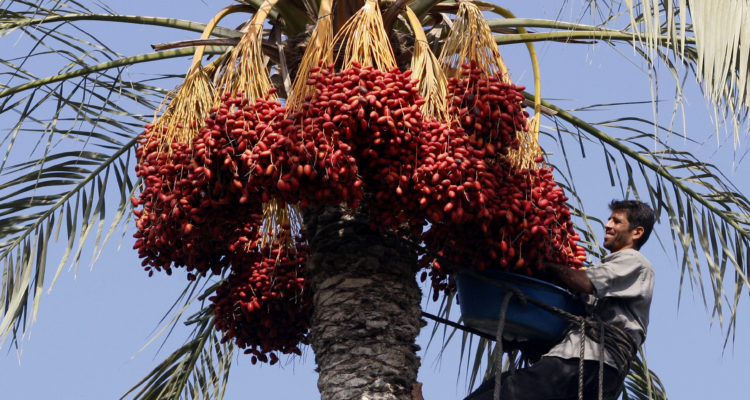The dates are the fruit of a decades-long project to germinate ancient seeds from the Second Temple Era discovered beneath the rubble during excavations of Masada.
By Donna Rachel Edmunds, World Israel News
A second crop of dates from palm trees grown from 2,000 year old seeds has been harvested, much to the delight of researchers at the Arava Institute for Environmental Studies at Kibbutz Ketura.
Last year, one of the palms, named Hannah, bore 111 dates. This year the crop is even larger, with researchers expecting to be able to sell some of the dates to visitors of their research center, according to Israel Hayom.
The dates are the fruit of a decades-long project to germinate ancient seeds from the Second Temple era discovered beneath the rubble during excavations of Masada by renowned Israeli archaeologist Yigal Yadin during the 1960s.
After the seeds had lain in storage for decades, Dr. Elaine Solowey, director of the Center for Sustainable Agriculture at the Arava Institute and Dr. Sarah Sallon, director of the Louis L. Borick Natural Medicine Research Center of Hadassah Hospital, initiated a project to germinate them, in an effort to reintroduce extinct plants that had previously grown in the region. The seeds are believed to be between 1,800 and 2,400 years old.
The project resulted in the germination in 2005 of Methuselah, the oldest ever seed successfully germinated. That success was replicated with the germination of six more ancient date palms – Adam, Boaz, Hannah, Yonah, Yehudit and Uriel – from a pool of 32 seeds found across a range of sites including Masada and Qumran. Having two female trees among the group allowed the researchers to pollinate the trees.
“It’s very exciting to taste the dates and see such a large and significant amount of fruit because we had no guarantees that we would get a fruit-bearing female tree,” Dr Solowey said. “So it looks like a miracle on several levels – seeds from archeological digs sprouted successfully, and against all odds, female trees sprouted among them. We are excited to revive an ancient variety of dates.”
Following a ceremony in a grove outside the Arava Institute, some of the participants tasted the fruit, which look similar to Medjool dates but are said to be much sweeter, with a taste reminiscent of honey.
The groundbreaking project, which has drawn international acclaim, is designed to track the origins of ancient palm tree populations, according to Dr Solowey. The researchers hope to learn about ancient farming techniques, speculating that the Judean strain created in Israel was a hybrid between Arabian Peninsula and North African date palms.





